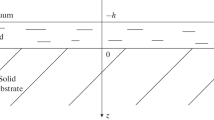Abstract
The article investigates acoustic waves in a subsonic viscous thermally conducting gas. Two descriptions of the medium are compared: a description in terms of Navier–Stokes equations and a description as a quasi-gas-dynamic system based on a difference approximation of the Boltzmann equation. Reflection of acoustic waves from artificial boundaries in the numerical region is considered, and special boundary conditions are constructed to ensure damping of nonphysical modes. A difference approximation of such boundary conditions is investigated. The procedure is tested in application to viscous flow around plates.
Similar content being viewed by others
REFERENCES
L. V. Dorodnitsyn and B. N. Chetverushkin, “An implicit scheme for simulation of subsonic gas flow,” Mat. Model., 9, No. 5, 108-118 (1997).
T. G. Elizarova and B. N. Chetverushkin, “Kinetically consistent schemes for simulating viscous thermally conducting gas flow,” Zh. Vychisl. Mat. Mat. Fiz, 28, No. 11, 1695-1710 (1988).
L. V. Dorodnitsyn, B. N. Chetverushkin, and E. V. Shil'nikov, “On implicit kinetically consistent schemes,” Mat. Model, 11, No. 7, 64-74 (1999).
S. V. Tsynkov, Construction of Numerical Algorithms for Flow Past Bodies in Regions with a Curvilinear Boundary [in Russian], Dissertation, Moscow (1991).
V. S. Ryaben'kii, “Exact transfer of boundary conditions,” Vych. Mekh. Deform. Tverd. Tela, No. 1, 129-145 (1990).
B. Engquist and A. Majda, “Numerical radiation boundary conditions for unsteady transonic flow,” J. Comp. Phys., 40, No. 1, 91-103 (1981).
A. Bayliss and E. Turkel, “Far field boundary conditions for compressible flows,” J. Comp. Phys., 48, No. 2, 182-199 (1982).
D. Givoli, “Non-reflecting boundary conditions,” J. Comp. Phys., 94, No. 1, 1-29 (1991).
J. Blaschak and G. Kriegsmann, “A comparative study of absorbing boundary conditions,” J. Comp. Phys., 77, No. 1, 109-139 (1988).
L. Tourrette, “Artificial boundary conditions for linearized compressible Navier-Stokes equations,” J. Comp. Phys., 137, No. 1, 1-37 (1997).
L. V. Dorodnitsyn, Acoustic Waves and Boundary Conditions in Viscous Subsonic Flow Models [in Russian], Preprint, MGU, Moscow (1999).
L. Tourrette, “Artificial boundary conditions for the linearized compressible Navier-Stokes equations. II. The discrete approach,” J. Comp. Phys., 144, No. 1, 151-179 (1998).
K. W. Thompson, “Time-dependent boundary conditions for hyperbolic systems,” J. Comp. Phys., 89, No. 2, 439-461 (1990).
B. Gustafsson and A. Sundstrum, “Incompletely parabolic problems in fluid dynamics,” SIAM J. Appl. Math., 35, No. 2, 343-357 (1978).
O. M. Ramahi, “Complementary boundary operators for wave propagation problems,” J. Comp. Phys., 133, No. 1, 113-128 (1997).
A. A. Samarskii, Theory of Difference Schemes [in Russian], Nauka, Moscow (1989).
Rights and permissions
About this article
Cite this article
Dorodnitsyn, L.V. Acoustics in Viscous Subsonic Flow Models with Nonreflecting Boundary Conditions. Computational Mathematics and Modeling 11, 356–376 (2000). https://doi.org/10.1023/A:1012588328522
Issue Date:
DOI: https://doi.org/10.1023/A:1012588328522




